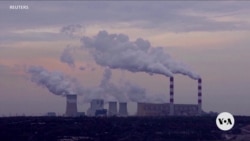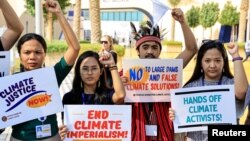Nearly 200 countries signed a deal Wednesday at the COP28 climate summit in Dubai to transition away from fossil fuels. Proponents say it heralds the end of the age of oil — but not all nations are satisfied with the text of the deal.
The deal calls for “transitioning away from fossil fuels in energy systems, in a just, orderly and equitable manner ... so as to achieve net zero by 2050 in keeping with the science.”
It also calls for a tripling of renewable energy capacity globally by 2030, speeding up efforts to reduce coal use, and accelerating technologies such as carbon capture and storage.
Sultan al-Jaber, the COP28 president who also is head of the United Arab Emirates’ state-owned oil firm, said the deal could prevent global warming exceeding 1.5 degrees Celsius above pre-industrial levels, the target agreed to at the Paris climate summit in 2015. Scientists say that exceeding this level of warming will likely cause irreversible and increasingly catastrophic climate change.
“It is a plan that is led by the science. It is a balanced plan that tackles emissions, bridges the gap on adaptation, reimagines global finance and delivers on loss and damage,” al-Jaber said of the COP28 agreement.
He called the deal “historic” but added that its true success would be in its implementation. “We are what we do, not what we say. We must take the steps necessary to turn this agreement into tangible actions,” al-Jaber told delegates in Dubai.
Many nations, including the United States and China – the world’s two largest emitters of greenhouse gases – welcomed the agreement after two weeks of hard-fought negotiations.
“Everybody here should be pleased that in a world of Ukraine and the Middle East war and all the other challenges of a planet that is foundering, this is a moment where multilateralism has actually come together and people have taken individual interests and attempted to define the common good,” John Kerry, the U.S. climate envoy, told delegates Wednesday.
However, more than 100 countries, including many European states, had lobbied for stronger language to fully phase out fossil fuels.
They faced strong opposition from oil-producing members of the OPEC cartel, led by representatives from Saudi Arabia, who argued the world can slash emissions without shunning specific fuels.
That prompted criticism from some delegates, including small island states, that are most vulnerable to rising sea levels in a warming world.
“We have made an incremental advancement over business as usual, when what we really needed is an exponential step change in our actions and support,” said Anne Rasmussen, the chair of the Alliance of Small Island States, whose members include 39 island nations.
Many climate change campaigners said the text of the deal is too weak. “On the one hand, this is a good sign and signal that the world is finally dealing with fossil fuels after almost three decades of refusing to deal with it. But on the other hand, the new text includes cavernous loopholes that will allow for the oil and gas industry to continue,” said Jean Su of the Arizona-based Center for Biological Diversity.
Those loopholes include the use of so-called carbon capture technology, which removes some carbon dioxide emissions from the burning of greenhouse gases.
“That technology exists in some places, but it’s never been proven to work at the kind of scale that you would need if you were to continue burning fossil fuels,” said Ruth Townend, a research fellow with the Environment and Society Program at Chatham House, a research institution.
Scientists say we need to cut greenhouse gas emissions by 43 percent in just six years, in order to meet the target of limiting global warming to 1.5 degrees Celsius above pre-industrial levels.
“The energy transition to renewables is far more feasible than trying to capture carbon from the atmosphere. We know what we need to do. And governments now need to find ways that work for them economically and politically to commit to that and deliver it. And that needs to happen very fast,” Townend told VOA.
Along with the agreement to transition away from fossil fuels, the COP28 summit secured agreement on a loss and damage fund, with close to $800 million pledged during the conference.
“The new fund helps the poorest countries of the world and the ones most vulnerable to climate change with money for the loss and damage that they are experiencing when they have a hurricane, flooding, fires or other damage to their economies,” said Professor Michael Jacobs, of the London-based ODI research group.
“Some of the richer countries have put in money for this fund. They still need to make good on this money. It’s a pledge at this point but normally pledges are realized in time. It’s something that the poorer countries have wanted for some time,” Jacobs told VOA.
COP28 also saw the first ever ‘global stocktake’ – a new process whereby countries assess their progress toward achieving the goals of the Paris Climate Change Agreement, to be conducted every five years. The conclusion from COP28 is that the world remains well off target, said Teresa Anderson, who leads climate justice research at the global non-profit, ActionAid International.
“The global stocktake report is quietly devastating in U.N. language. It says in no uncertain terms that we are not on track to save ourselves. The question is now, what do we do with that knowledge? Do we actually realize that we need to do something very different and very soon? Otherwise, we’ll be pushing the planet to the brink,” Anderson told VOA.
Dale Gavlak contributed to this report.







